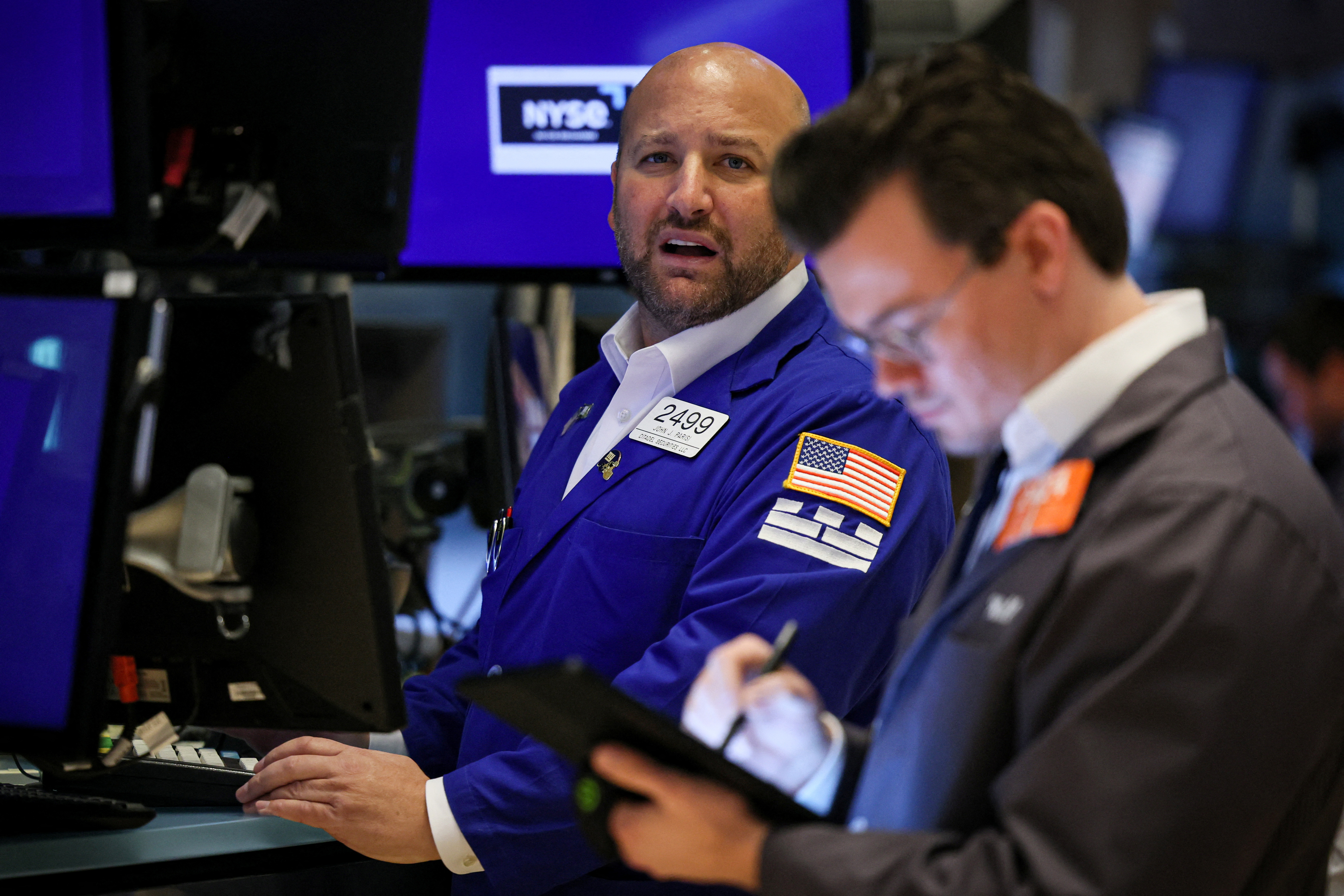
Traders work on the floor of the New York Stock Exchange (NYSE) in New York City on September 28, 2023. REUTERS/Brendan McDermid/File Photo Get license rights
Oct 13 (Reuters) – The S&P 500 and Nasdaq ended lower on Friday as poor consumer sentiment data and Middle East conflict prompted investors to risk bets and overshadowed upbeat quarterly earnings from some major U.S. banks.
Wall Street’s three major indexes opened higher but lost ground after an early reading of US consumer sentiment showed a sharp drop in October. The Dow managed a small gain.
Investors were also monitoring news from the Middle East. On Friday Israel said it carried out strikes inside the Gaza Strip, the first announcement of ground operations targeting Hamas militants since their deadly rampage in Israel. The United Nations said Israel’s call for Gaza’s citizens to leave was impossible without “catastrophic humanitarian consequences.”
U.S. crude oil prices rose 5.8% and U.S. Treasury prices rose as investors looked for safety.
“It’s indicative of a risk-on sentiment,” said Lauren Goodwin, an economist and portfolio strategist at New York Life Investments. Bonds, stocks and oil actions reflected concerns about deteriorating consumer sentiment, the global economy and geopolitical conflicts, she added.
While the data is good at this point in the economic cycle, “it’s expected to deteriorate over the next few months,” Goodwin said, adding, “Leadership changes are incredibly common and no single market narrative lasts more than two days. At a time.”
However, unless there is a major escalation in the Middle East war, the strategist said he did not expect Friday’s mood to “signal the start of a troubled market.”
The Dow Jones Industrial Average (.DJI) added 39.15 points, or 0.12%, to 33,670.29, the S&P 500 (.SPX) lost 21.83 points, or 0.50%, to 4,327.78 and the Nasdaq fell 69 points. 1.23%, 13,407.23.
However, the S&P 500 posted a 0.45% gain for the week for its second consecutive weekly advance. The Nasdaq fell 0.18% for the week. The Dow showed a gain of 0.79%.
Among the S&P’s 11 major industrial sectors, energy (.SPNY) gained 2.3% as oil prices rose. Defensive sectors such as Utilities (.SPLRCU) rose 1%, and Consumer Staples (.SPLRCS) added 0.8%, the biggest gainers.
Other safe assets such as gold piled up.
Shares of JPMorgan Chase ( JPM.N ), Wells Fargo ( WFC.N ) and Citigroup ( CN ) rose after their quarterly profits beat analysts’ estimates, helped by higher interest rates. Wells Fargo rose 3% and JPMorgan gained 1.5%, but Citigroup lost steam and fell 0.2%.
The S&P 500 Banks Index (.SPXBK) rose as much as 3.4% and closed up 0.6% after a three-week high.
Patrick Harger, president of the Federal Reserve Bank of Philadelphia, said he believed the central bank could be done with its rate hike cycle as price pressures eased.
Among individual stocks, asset manager BlackRock ( BLK.N ) fell 1.3% after posting a sharp drop in quarterly net inflows.
UnitedHealth ( UNH.N ) advanced 2.6%, beating third-quarter profit estimates.
Dollar General ( DG.N ) closed up 9% after the discount store retailer brought back former CEO Todd Vasos to replace Chief Executive Jeff Owen.
Boeing ( BA.N ) fell 3% after the planemaker and Spirit Aerosystems ( SPR.N ) widened the scope of a production defect affecting the 737 Max 8 plane. Shares of Spirit lost 0.9%.
Declining issues outnumbered advancers by a 1.56-to-1 ratio on the NYSE; On the Nasdaq, a 1.68-to-1 ratio favored decliners.
S&P 500 hits 12 new 52-week highs and 20 new lows; The Nasdaq Composite posted 28 new highs and 335 new lows.
10.06 billion shares changed hands on US exchanges, compared to the 10.37 billion average over the past 20 sessions.
Reporting by Sinead Carew, Shashwat Chauhan and Angika Biswas in Bangalore; Editing by Shaunak Dasgupta, Anil de Silva, Shinjini Ganguly and Richard Chang
Our Standards: Thomson Reuters Trust Principles.